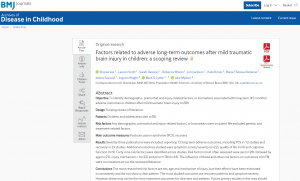Scoping review reveals gap in research on risk factors for post-concussion syndrome
4 April 2023
An NIHR ARC West scoping review has revealed the lack of robust research into the risk factors of post-concussion syndrome and long-term problems following head injuries in children. The review, which looked at the breadth and types of studies examining these risk factors, is published today in the Archives of Disease in Childhood.
Traumatic brain injury, when someone’s brain is injured by a blow to the head or other violent event, is the commonest cause of death and disability for people under the age of 40 in the UK. Between 33 and 50 per cent of these injuries are to children aged 15 or under.
These injuries are mild for most children, most of whom recover fully. However, some will develop symptoms such as headaches and dizziness, or changes to emotions, behaviour and ability to think and learn. These symptoms may be recognised as a post-concussion syndrome and can appear from days to months after the injury. They can be long-term and affect the child’s development and quality of life.
The research team did the scoping review as historically it has not been possible to predict which children are most likely to develop post-concussion syndrome after a mild brain injury. However, the review has revealed a lack of large, good quality studies on this issue. This means better research is needed to understand what factors influence whether a child gets post-concussion syndrome and other long-term symptoms or not.
They found 73 papers reporting 12 different post-concussion problems and 49 risk factors.
Just 12 studies assessed post-concussion syndrome. Only nine studies looked for factors affecting quality of life and the ability to think and learn after concussion.
The most studied post-concussion problems are recovery patterns (29 studies) and symptom severity (22 studies). However, these may not be the most important outcomes for patients and their families.
Of the 49 different risk factors, the most researched were:
- Sex: boys versus girls (28 studies)
- Age: younger versus older (23 studies)
- Injury mechanism: for example traffic accident, fall or sports injury (22 studies)
- Whether the child had had a concussion before (18 studies
However, none of these factors showed a clear effect on any of the post-concussion problems.
Dr Sharea Ijaz, lead author of the study and Research Fellow in Evidence Synthesis at NIHR ARC West, said:
“Our review has shown that better research is needed to understand which children are most at risk of developing problems after a mild brain injury. Most of the studies we found looked at recovery patterns and how severe symptoms were. But our work with clinicians, a child and a parent with experience of long-term post-concussion symptoms suggests that research should focus on different outcomes and risk factors in future.”
Paper
